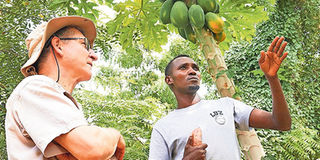Premier orchard stirs love of fruits

World Vision officer, Tony Rinaudo and Nathan Lepatoye in the latter's orchard in Ngurunit on the Samburu-Marsabit border. Lepatoye grows sukuma wiki, tomatoes, paw paw, passion fruits, bananas and guava on the one-acre piece of land. He also keeps cattle, goats, sheep and poultry on the farm. PHOTO | NICHOLAS KOMU | NMG
What you need to know:
- Seasonal rainfall on the ranges often provided short-lived promise of water, sometimes leading to inter-community clashes.
- For the few people who understood the nutritional value of fruits and vegetables, getting them was difficult due to the distance from the nearest market.
- To avoid more losses, the farmer took his fruits to Laisamis town but the results were the same. Lepatoye says he would at times sell a fruit that weighed up to five kilogrammes at only Sh20.
- Lepatoye grows sukuma wiki, tomatoes, paw paw, passion fruits, bananas and guava on the one-acre piece of land. He also keeps cattle, goats, sheep and poultry on the farm.
For generations, residents of Ngurunit on the Samburu-Marsabit counties boundary have known nothing but the taste of meat, milk and honey.
That is until Nathan Lepatoye introduced them to fruits and vegetables after he turned his dry homestead into a lush paradise. Pastoralists on Ndoto ranges have had to endure longs spells of drought.
Seasonal rainfall on the ranges often provided short-lived promise of water, sometimes leading to inter-community clashes.
Lepatoye’s lessons on agriculture and motivation from friends pushed him to consider taking a different path from pastoralism.
“I took the decision to try something different when I inherited my father’s land. I did not want to spend the whole of my life in the sun grazing cows and goats and passing that down to my children,” he told Seeds of Gold.
For the few people who understood the nutritional value of fruits and vegetables, getting them was difficult due to the distance from the nearest market.
“It would take months to get fruits and vegetables. The nearest market is in Meru, almost 400 kilometres away. The roads are bad and getting there was almost impossible,” Lepatoye said.
“Children suffered malnutrition. When I married, I vowed to give my family a different kind of life.”
With help from the German Cooperation and other donors, Lepatoye began growing watermelons. He used funds provided by the donor to harvest water from the seasonal rains. The water went into irrigating his orchard.
CHANGED THE CVOMMUNITY'S PERCEPTION
At first, the melons did not sell fast since very few people had tasted anything like that before.
“The fruits were huge and sweet. I was the only one eating them. Even my family hated the taste because it was strange,” Lepatoye said.
To avoid more losses, the farmer took his fruits to Laisamis town but the results were the same. Lepatoye says he would at times sell a fruit that weighed up to five kilogrammes at only Sh20.
“Fruits were a new thing for the residents. I was advised to give them out for free first as that would make locals get used to them,” he said.
“I would give them to my neighbours. Gradually, they came to accept and like the melons.”
Over the years, Lepatoye has turned his old desert home into a green paradise with an orchard and a kitchen garden. He produces many kinds of fruits and vegetables.
Lepatoye grows sukuma wiki, tomatoes, paw paw, passion fruits, bananas and guava on the one-acre piece of land. He also keeps cattle, goats, sheep and poultry on the farm.
Lepatoye believes his efforts have changed the community’s perception of nutrition. He is able to provide his family with nutritious food. Many locals consume fruits and vegetables, something that was rare in the past.
“I can provide my three daughters with good food and live in a relaxing environment. I am also happy because many young people have taken interest in fruit and vegetable farming,” Lepatoye said.
He has embraced a unique concept of natural regeneration of trees to keep his homestead green. The programme, supported by the NGO World Vision, involves caring for trees that were cut down to make them regenerate.




